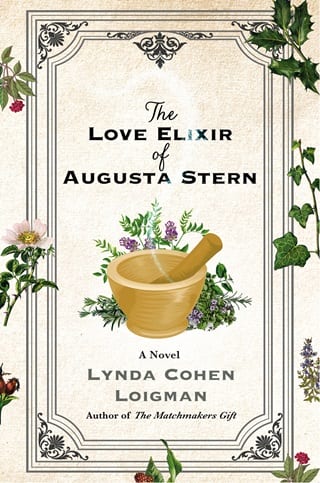Chapter Fourteen
FOURTEEN
JUNE 1923
At breakfast the next morning, Augusta told her father that she would gladly deliver Mrs. Dornbush’s purchases. The Dornbushes lived near the library and Augusta had some books she needed to return. School was out for the summer, so aside from helping out at the store, she had no other place she needed to be. “It will save Irving a trip,” she said.
“Fine,” her father agreed. “Let me know how she’s doing.”
Augusta did not mention that, in addition to the pills and the Kotex, she would be delivering something special to their valued customer.
The Dornbushes lived on Glenmore Avenue, on a wide, tree-lined block filled with wooden row houses. The block was cleaner and brighter than most, filled with schoolgirls playing jacks and young boys riding bicycles. As they approached the door, Augusta held her breath. What if Mrs. Dornbush wasn’t at home? What if she was home, but refused to answer? Augusta tried not to dwell on all the unlucky possibilities.
Fortunately, Harriet Dornbush opened the door, wearing a crisp day dress in brown-and-white gingham and the same pair of two-tone, brown kid shoes she had worn last month when she’d first seen the kittens.
“Good morning,” Augusta said. “I’m Solomon Stern’s daughter, from the pharmacy.” She held up the plain white paper bag and waved it slightly in the air. “You left your purchase at the register yesterday.”
Despite her stylish appearance, Harriet Dornbush was bleary-eyed and pale. Her dress hung limply on her frame, and she looked as if she hadn’t slept in days.
“Oh,” she said, staring blankly at Augusta. “How nice of you to come. Thank you, dear.”
Augusta held out the bag. “It’s no problem,” she said. “It isn’t far from the store.”
From behind her, Esther cleared her throat. “Not far for young legs,” she clarified. “A little farther for old ones, like mine.”
Augusta stepped to the side to make room for Esther in the doorway. “This is my great-aunt,” she said. “We were walking to the library and your house was on the way.”
The young woman tilted her head and stared. Despite the summer heat, Aunt Esther was dressed in her usual attire: a baggy black dress, thick black stockings, and old-fashioned boots up to her ankles. Her silver hair was hidden by a scarf, and she smelled earthy and wet, like the herbs from her kitchen.
“Oh,” said Mrs. Dornbush. “Well, thank you again. I hope you both enjoy the library.” As she moved to push her front door shut, Augusta jumped forward. “One more thing!” she said, motioning to Esther, who pulled a jar from inside her bag and thrust it into Harriet Dornbush’s hands. “We brought you some homemade soup.”
Mrs. Dornbush looked at the jar and blinked. “How thoughtful,” she said. “What a nice surprise. But isn’t it a bit warm for soup?” She held the jar a little higher so that she could make out what was inside. “Is that kreplach?” she asked, brightening a bit. “My mother used to make kreplach for me. I haven’t had it in years.”
“ My kreplach melts in your mouth,” said Esther. “You should only enjoy it in good health.”
Augusta elbowed her aunt. The night before, she’d made it clear that Esther was not to bring up Mrs. Dornbush’s condition. “She spoke to my father in confidence,” Augusta had said. “She doesn’t know that I overheard.”
“How can I help if I can’t talk to her?”
“Can’t you just put some herbs in her soup?”
Esther had glared at her niece. “This isn’t like adding a pinch of salt. Listen to me now, Goldie, and remember what I tell you. You must never treat anyone without permission. Don’t you dare speak such foolishness to me again.”
“You didn’t ask Irving for permission.”
“Irving was ill. It was an emergency. That was a different situation. I need to know more about Mrs. Dornbush’s condition, from her own lips, in her own words. She will have to tell me what she wants.”
Augusta had let out an exasperated sigh. “How are we going to get her to do that? She’s too embarrassed to come to the pharmacy. What if she never comes back again?”
“We’ll drop off some soup as a gift,” Esther said. “Whenever anyone tastes my soup, they always come back for more.”
Two days after they delivered the soup, Mrs. Dornbush returned to the store on Sutter Avenue. She was still too pale and much too thin, but her eyes were brighter than they’d been before. She carried the clean, empty soup jar and held it out to Augusta. “I brought this back for your aunt,” she said. “I was wondering if I might ask her for another jar?”
Augusta glanced around the store to make sure her father wasn’t watching. “I’ll take you upstairs,” she said quietly. “You can talk to her there.”
She scooted far enough ahead so that anyone watching wouldn’t notice that Mrs. Dornbush was following her. They went out the shop entrance and to the building’s side door, where Augusta led the young woman up the stairs. When they got to her apartment, Aunt Esther was in the kitchen, rolling out dough for her kreplach. A pot was bubbling on the stove, and the room smelled of onions and browning meat. The windows were open so that a breeze blew in from the street, ruffling the edges of the curtains. Aunt Esther did not look up when they entered, but on her lips, Augusta saw a satisfied smile.
Augusta cleared her throat. “Remember Mrs. Dornbush?”
“Of course,” said Aunt Esther. “You liked the soup?”
“Very much,” said Mrs. Dornbush. “It was exactly as you said. The kreplach melted on my tongue.”
Aunt Esther nodded and wiped her hands on her apron.
“I’d been feeling poorly,” Mrs. Dornbush confessed. “But I’m feeling a bit better now.”
“Soup makes everyone feel better,” said Esther. Her tone was cool and noncommittal, as if she were daring the woman to say more.
Mrs. Dornbush tugged at the skirt of her dress with obviously trembling fingers. “That’s true,” she said. “But I’ve heard that your soup is special.”
Aunt Esther kept her eyes on her dough while Mrs. Dornbush continued to fidget.
“One of my neighbors saw you leaving our building. She said people say your soup cures indigestion. They also say you make a cream that gets rid of blemishes.”
“You have no blemishes,” Aunt Esther observed.
“No. But I do have a different problem.”
Esther gestured to the chairs around the kitchen table. She wiped her hands on her apron. “Sit,” she said. “Start from the beginning.”
As soon as she began to tell her story, Harriet’s face became a map of her grief. Sorrow poured through her lips like rivulets breaking off from a swollen stream: seven years of frustration, untold visits to doctors and specialists, daily mortifying encounters with pregnant women and children on the street. She described it all in painful detail.
“I wonder whether you can give me something,” she said. “Some kind of advice or medicine or… anything .”
Esther bit her lower lip. Augusta sensed that her aunt was more moved by Harriet’s story than she’d expected to be. “I may have some advice,” Esther said cautiously. “Perhaps a few remedies as well. But if I agree to help you, you must do everything I say.”
A flash of skepticism crossed the young woman’s face, but she quickly remembered herself. She folded her hands on the top of her lap and nodded at Esther, the picture of obedience. For the next fifteen minutes, Esther was in motion, gathering items from around the apartment: a jar of castor oil, a soft white cloth, an old hot water bottle from the trunk by her bed. All these she placed on the kitchen table in front of Mrs. Dornbush.
Next came a list of strict instructions. “Rub the castor oil onto your stomach, cover it with the cloth and then the hot water bottle. This you should do for one hour every day, after you eat your breakfast.”
“I don’t eat breakfast.”
“Humph,” Esther grunted. “From now on, you will have two eggs every morning. Then use the castor oil. You understand?”
Mrs. Dornbush bowed her head in agreement and tucked the items carefully inside her purse. But when she tried to get up from the table to leave, Esther motioned for her to stay put.
“Tomorrow, I will prepare some special soup—a plain broth for you to eat. Augusta will deliver it.”
“All right,” said Mrs. Dornbush. “Is there anything else?”
“Your husband,” said Aunt Esther. “He travels for work?”
“He does. But I don’t see how that matters—”
“You must ask him to stay home for two months.”
Mrs. Dornbush’s hopeful expression crumpled. “I’m not sure I can convince him of that. Jerry has accounts all over. He’s very serious about his work.”
“Is he serious about having a child? If you want a baby, you need your husband at home. A man and a woman… it requires time and frequency. I don’t have to explain this to you, do I?”
“Of course not!” The young woman blushed. “We don’t need to get into that in front of your niece. I’ll convince him not to travel for a couple of months. At least I promise to do my best.” Mrs. Dornbush rose from her chair, looking utterly exhausted. “I assume that’s everything then?”
“No,” said Esther, pointing one finger at Mrs. Dornbush’s feet. Harriet was wearing the black-and-rose patent leather shoes that Augusta had so recently admired. “Your shoes,” Esther said. “Take them off.”
Mrs. Dornbush blinked repeatedly. “You want me to walk home barefoot? Are you joking?”
Aunt Esther wasn’t laughing. “What is your shoe size?”
“Seven. But I don’t understand…”
Esther exited the kitchen and began rummaging in the front hall closet. A few moments later, she returned carrying a pair of plain brown boots that had once belonged to Augusta’s mother. Augusta bit her lower lip. She didn’t want Mrs. Dornbush to take her mother’s boots, but she swallowed down her protests.
“Put them on,” Esther said. “From now on, kinehora, you will wear only these.”
Augusta knew what kinehora meant—it was the phrase the old women in the neighborhood spoke when they wanted to ward off the Evil Eye.
Esther murmured an explanation, but Mrs. Dornbush still looked confused.
“Jealousy tempts the Evil Eye,” Esther clarified. “Even in those who are unaware of it.” She pointed to the patent leather shoes on Harriet’s feet. “The shoes you wear—so beautiful, so elegant. No one in the neighborhood has anything like them. Everyone sees them, everyone notices. People want what they don’t have.”
“Are you saying that I can’t get pregnant because people are jealous of my shoes ?”
Aunt Esther shrugged. “Who can know?”
“Let me make sure I understand. You think if I wear these old boots, it will help me to conceive a child?”
Esther shrugged a second time. “Seven years you’ve suffered without a baby. Seven years of fancy shoes and seven years of an empty womb. What’s the harm now if you follow my advice?”
Mrs. Dornbush stared at the boots in Esther’s hands. With a resigned expression on her face, she sat back down and unbuckled her pumps. Once the boots were on her feet, she tested them by walking around the table. “Not bad,” she said. “At least they’re comfortable.”
As Esther’s newest client circled the table a second time and then a third, Augusta knew exactly what her aunt was thinking. Your comfort is the least of my concerns. I would have told you to wear those boots even if they gave you blisters.
But all Esther said was “ Kinehora.”
The night following Harriet Dornbush’s visit, Augusta slept with one eye open. Long after midnight, when she heard her aunt stir, Augusta followed her into the kitchen. Esther knew that Augusta was trailing her, but she didn’t say a word as she moved down the hall, carrying the wooden apothecary case that she had taken from inside her trunk. Her long silver hair hung loose down her back, and the bottom of her silky blue robe skimmed over the wooden floor.
This time—for Augusta’s benefit—she whispered the names of her ingredients: pomegranate seeds, black cohosh, stinging nettle, raspberry leaves, viburnum. The spicy aroma of licorice root hit the back of Augusta’s nostrils.
The moon showed itself as if Esther had summoned it, peering in through the window like a dutiful friend, illuminating the mortar until the brass seemed to glow. As she ground the ingredients, she hummed her strange song. An entreaty. A wish. An incantation. A prayer. The pestle blazed bright from between her long fingers, until the room smelled of potency, abundance, and hope.
When she was finished grinding the herbs, she deposited the powder in another square of clean white muslin and tied it with string. This time, she handed the mortar to Augusta and asked her to wipe it clean. It was heavier than Augusta expected, and felt rougher to the touch. “How long have you had this?” Augusta asked.
“It belonged to my mother, her mother before her, and her mother before that. One day, perhaps, it will belong to you.”
Augusta felt her pulse quicken in her veins. “Do you really think so?”
Esther nodded. “I told you that you had the heart of a healer, and I believe it to be true. Of course, the path will not be easy. There is a great deal to learn and you will have to work very hard.”
“I’ll work harder than anyone,” Augusta insisted. “But if I want to learn from you, does that mean I shouldn’t go to pharmacy college?”
“Of course you should go to college!” Aunt Esther snapped. “When I was young, I had no such opportunity. My brothers were sent to study in Lviv, but my sisters and I were not allowed to go. I was as bright as you are now—equally curious, equally ambitious. But because I wasn’t born a man, I was forced to stay at home. I learned everything I know of plants and potions from my mother and my grandmother. But if I’d had the chance to go to university, who knows how much more knowledge I might have collected? You must go to college, Goldie. You must do what I could not.”
“Did your mother and grandmother teach your sisters, too?”
Aunt Esther shook her head. “Neither of my sisters wanted to learn. One married a farmer and one a stonemason. When I grew older, they were ashamed of me—ashamed of their strange spinster sister. What was more, they did not like that I advertised my knowledge. My mother and grandmother had kept their skills private, but I chose to share mine with others. Many in my village were grateful to me, especially when my powders cured them of illness. But others accused me of being a witch, a Baba Yaga of the forest. They said I flew above the trees at night, sitting inside a wooden mortar, like a witch on a broom. They said I steered with an enchanted pestle, inflicting disease on whoever wronged me. They blamed me whenever they had a cough, or if they sneezed or had a toothache.”
“That’s ridiculous,” Augusta said. But she didn’t feel entirely convinced.
Esther raised her silver eyebrows. “I wanted to study medicine and healing. If I had been born a man, they would have called me an apothecary. Perhaps even a doctor, if I’d had the training. But because I was born a woman, they called me a witch instead. To ignorant men, every gifted woman is a witch.”
“But you know things my father doesn’t know,” said Augusta. “You’re able to help people in ways that he can’t. How?”
“If a person is denied a formal education,” said Esther, “she must be inventive in her quest for knowledge. She must study the folktales and the old stories. She must learn however she can. She must use every tool at her disposal.”
“Like your mortar?”
“Like my mortar.”
“Will you tell me about the words inside it? The words you are always repeating? Please, will you explain what they mean?”
“The words themselves could not be simpler. They state the mortar’s purpose, that is all.” She held up the mortar and pointed inside it as she recited the words in English.
To ease the pain of those who suffer
To repair the bodies of those who are ill
To restore the minds of those in need
“But if the words are so simple,” Augusta pressed, “why are they so important?”
“Must words be complicated or unusual for us to believe in them?”
“Maybe not, but you still haven’t explained why the words are necessary at all. Words can’t simply make someone better. Words don’t have that kind of power.”
Esther put all of her tins and bottles back in the proper places in her case. She stared at Augusta for a good long while. “Words can do anything, ” she said. “A kind word can fix a person’s spirit. A cruel one can break a person’s heart. Wicked words have caused wars, and honest words have made peace. Why shouldn’t they be able to heal?”
 Fullepub
Fullepub 



